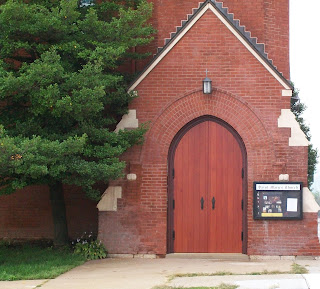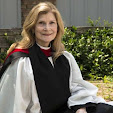Driving to work earlier this week my thoughts were bouncing around between comments in the blog of Landon Whitsitt about Lillian Daniel, a Chicago clergywoman lately engaged in wrestling the concept of "spiritual but not religious" to the ground. I read Landon's comments in the context of NPR's recent series on "the nones," the growing number of Americans who do not identify with a particular religious tradition. Also in the mix were the Conversion of St. Paul last observed last Friday and the sad death of Lady Sybil on Downton Abbey. Heat, stir, add caffeine and you have a blog post.
Somewhere in my travels since last Sunday I saw a tongue in cheek comment that Lady Sybil's tragic end is what happens when men make decisions about women's health care. Lillian Daniel's comments come down hard on anyone who claims a spiritual life but practices it outside a religious tradition with a long pedigree. Is that judgment analagous with Lord Grantham's decision to put his daughter's life in the hands of the posh London obstetrician rather than the local doctor who argued for treating her on the basis of what her mind and body were doing? Lord Grantham asserted his authority as lord of the manor over the objections of the local doctor and Lady Grantham, one two women present who had actually experienced labor and delivery of a child, again, another triumph of tradition over the evidence before their eyes. The two stood by horrified as their youngest daughter died an agonizing death.
Who gets to decide or define what legitimate religious belief and practice are? What are the criteria? Among Lillian Daniel's many comments on the "spiritual but not religious" is the following: "It's not all about you and no, you can't make it up. The beauty of long tradition is that it is bigger than anything we can do by ourselves." I don't particularly disagree with her about the beauty and value of a long-established religious tradition. But I wonder if denigrating those who dare to say they pray but have not yet put down roots within a particular tradition does more harm than good.
St. Paul, whose conversion we commemorated last week took the gospel to the gentiles a couple of decades after Jesus' death. When these new believers wanted to identify with what was at the time the "established" community of Jesus' followers, its elders responded with a challenge to their legitimacy: they hadn't fully undertaken the "long tradition" of the Jews. How could they be legitimate followers of Jesus without doing so? Is Lillian Daniel's scorn for the "spiritual but not religious" at least somewhat similar to the response of the Jerusalem church to Paul's fractious and far-flung gentile churches?
You know the outcome of that argument. It wasn't long before you could be a Christian without being a Jew first. In areas where Jesus' followers were part of the synagogue community, the two groups ultimately became distinct from each other with no overlap. In gentile territory, the churches founded by Paul were, in some sense, "making it up." We don't see it that way now because their theology and piety are part of that "long tradition" of Christianity, but religious tradition doesn't just happen. It is brought about through the application of human memory, reason and skill. Religious conversion and affiliation with a faith community don't just happen. Surely some inclination to engage in spiritual life has to be present before someone decides to walk through the doors of a church.
With regard to the "nones" I think it's likely that they're not in the early stages of the process of establishing another world religion. But think about it a different way. One of the things I heard from the group of "nones" interviewed in NPR's series on young Americans who are not affiliated with organized religion is that many of them have a lot of respect for religious tradition and practice. They find attractive the idea of affiliating with a community that is committed to peace and justice and they see the church, in general, as such a community. Several of them said that they pray, not infrequently. Many of them said that they had not found a church where they felt at home. Lillian Daniel seems to question their expectations and to say "get over it" with regard to their desire to feel at home in a church. She describes the "spiritual but not religious" as being "stuck" and asserts that they "know they are missing something." She challenges them to "look around" and see the many beautiful options in the religious landscape" and advises them "you don't have to be out there on your own."
My experience with "nones" who eventually became church members is that there is great rejoicing over the work of the Holy Spirit for having drawn them into the church. Is it possible that people who describe themselves as spiritual but not religious are in an early stage of the Spirit's work? Does it make sense to beat them up or say we feel sorry for them because they haven't yet found a faith community? Would you say the same thing about someone who senses that her vocation is for marriage but who hasn't yet found the right person to marry? It may not matter who gets to decide at what point a religious tradition becomes long, venerable and legitimate or where lies the dividing line between "making it up" and legitimate spiritual practice anchored in tradition. But I'm guessing that those of us now inside the churches will appear more welcoming to newcomers if we're willing to accept them where they are rather than ridiculing them for where they have not yet been.
Christianity has a long history of doing just that. This Saturday, February 2 is the Feast of the Presentation of Jesus in the Temple. The religious holiday commemorates the events described in Luke 2.22-40. His parents take him to the temple 40 days after his birth. They do this in accordance with Jewish tradition to complete his mother's ritual purification after childbirth and to sacrifice animals in redemption of their first born as directed in the book of Leviticus. While in the temple they encounter an elderly man, Simeon. He has been told by God that he will not die until he sees the Messiah. He recognizes Jesus as the one.
February 2 is known more colloquially as ground hog day. There's a reason why it's the same day as the Presentation. As Christianity spread throughout Europe, evangelists encountered persons who practiced religions that involved belief in multiple Gods and were based in phenomena of the natural world. They were open to conversion to Christianity, but such conversions frequently involved incorporation of existing traditions into a Christian framework. The late winter Celtic feast of imbolc coincides on the Christian calendar with the Feast of the Presentation and St. Brigid's Day on February 1. Imbolc falls halfway between the Winter Solstice and the Spring Equinox - just about the time we in the northern hemisphere are longing for the warmth and longer days of spring. Bonfires and candle lighting are among the practices associated with the festival. A candlelight procession opens the traditional liturgy of the Feast of the Presentation. The long tradition of the church that Lillian Daniel considers essential to legitimate religious practice has plenty of twists and turns toward earlier groups of "nones."
I have identified myself as a Christian and been associated with the church for most of my life. I don't expect that to change. I'm an Episcopalian, a form of Christian belief and practice that considers tradition, in balance with scripture and reason, to be central to the faith. I enthusiastically encourage anyone who has not found a church where he feels at home to engage with the Episcopal Church. I've known a fair number of "nones" who have done that and gone on to feel at home and grounded in our four plus centuries of tradition. One of the reasons why is that we are at ease accepting people where they are and giving them time and space to get where they're going spiritually. It's a journey for all of us and we all have different starting points.
Subscribe to:
Post Comments (Atom)



No comments:
Post a Comment